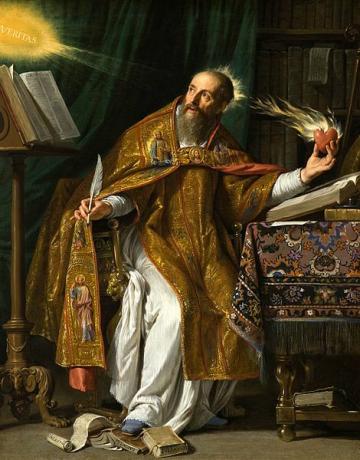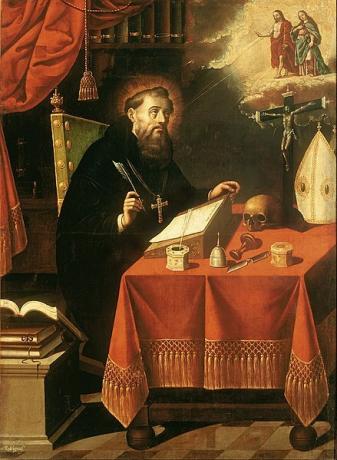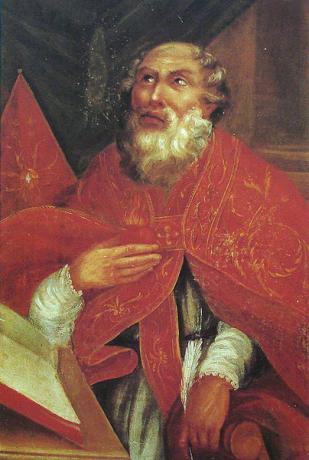Aurelius Agostinus, Augustine of Hippo or Saint Augustine he was one of the philosophers of patristic philosophy, considered one of the fathers or one of the doctors of the Catholic Church. His period, the patristic period, consists of the first effort to create a theological and doctrinal basis for Christianity, which already existed as a religion, but lacked a doctrine that would support the entire institutional foundation of the Church. Augustine is one of those responsible for creating this foundation with his Christian philosophy.
Read too: Scholasticism - philosophical period that followed the patristic
Biography of Saint Augustine
Saint Augustine Aurélio Agostinho was born in 354 d. Ç. His birthplace was the city of Tagaste, in the territory currently composed of Algeria, at the time under the rule of the Roman Empire. Augustine's father was a pagan (something common at the time, as Christianity was recent and had left problematic marks on the empire due to the subversive image of Jesus Christ). His mother, Monica (later canonized as St. Monica), was a devout Christian.

Augustine grew up in the way considered by Christianity to be sinful and pagan, on account of his father's influence. The biographies of Augustine and Monica state that the mother was very distressed by her son's behavior and always prayed for his conversion. However, she wisely never forced or imposed religion on her son, even when he was a child.
Augustine studied logic, philosophy and rhetoric. became a great rhetoric teacher, being recognized in the Roman Empire. He sought, based on his studies, various ways to find some spiritual comfort. Augustine approached Manichaeism, religious doctrine with a syncretic basis (Christian and pagan, arising from Zoroastrianism), which saw a moral dualism in the world, which would be divided only between two forces in balance: the good and the bad. Also, Augustine approached ancient Greek philosophical doctrines, like the hedonism it's the skepticism.
Do not stop now... There's more after the advertising ;)
Augustine became involved with a woman, had a child with her at the age of 18, Adeodato, and maintained a relationship considered by the Church to be sinful for 13 years. Upon separating from her, Augustine had affairs with other women.
Around his 30 years of age, the intellectual began to listen to the preaching of Bishop Ambrose, an important cleric, on account of rhetorical questions. The moment lived by Augustine was troubled: he had interpersonal difficulties in his love relationships and with his mother of Adeodato, besides finding himself spiritually helpless by all the doctrines he sought: Manichaeism, hedonism and skepticism.
Nevertheless, the closeness between Augustine and his son was very close. They were immersed in an increasingly Christian culture, until Augustine opted for Christianity as a religion, when Adeotado was 15 years old.
His story says that the saint, on a day of great anguish, received the visit of an enlightened being, probably an angel, who handed him a book and ordered him: "Take it and read!" Augustine obeyed him, and from that restorative moment he would yield to Christianity as a religion. After this episode, Bishop Ambrose baptized Augustine and Adeodato. Shortly thereafter, his son died. As if the suffering of his son's death was not enough, Augustine also faced the death of his mother a short time later.
His life after conversion and losses was dedicated to the Catholic Church. Augustine founded a religious order, and after the approach and death of the old Bishop of Hippo, the religious was consecrated bishop from the same city, holding the post until 430, the year of his death.

Philosophy of St. Augustine
It is difficult to translate Augustine's philosophy into a few words, as he dealt with the most various themes in defending the first theological foundations of Christianity. Augustine wrote, for example, about time. Something that intrigues religious, scientists and philosophers, the time it is, according to the patristic philosopher, something he knows what it is, but cannot answer if asked. This leads the interlocutor to think about something that would be very important nowadays: intuitive knowledge.
In addition to time and other matters important to philosophy and the Catholic Church, Augustine wrote about the good and evil. In the philosopher's view, when trying to resolve the ancient paradox of omnipotence and the supreme benevolence of God over evil, it is said that God is the supreme good and the only possible way to good. However, there is the possibility left by free will that man turns away from good and goes towards evil. God would be good and distance from God would be evil, the opposite path to divine enlightenment.
See too:Aquinas – philosopher who addressed the conflict between reason and faith in the Middle Ages
patristic
Augustine is inserted in the period called patristic philosophy. The big problem faced by the patristics was to get lay the foundations of Christian thought that would convince the faithful and, more than that, it provided a basis for the formulation of Christianity. Before Augustine, we have Neoplatonism as a philosophical principle to rescue philosophy platonic, but we also have the period of the so-called apologist priests, those who dedicated themselves to weaving true defenses (or apologies) of Christianity in their times.
Among the leading apologists we have Justin and Tertullian. Augustine positioned himself as a defender of Justin's thesis: that ancient Greek philosophy, even being pagan, would provide a means of understanding fundamental questions for Christianity. Thus, Augustine became one of the “fathers” of the Church, being an important name in patristic philosophy. To learn more about this period of medieval philosophy, read: patristic.
Works of Saint Augustine
The main works written by Saint Augustine are Confessions and God's city. Confessions it has a highly autobiographical tone. In this book, the philosopher speaks of the period of his life in which he was not converted, speaks with propriety of the sin, Manichaeism and hedonism. It also tells how he was lately converted to the Christian faith.
In God's city, the philosopher speaks of dogmas related to christianity, as the eternal life of the soul and bliss, beyond paradise and the goodness of God. The writings contained in this work show themselves as the principle for understanding a Christian philosophy.

St. Augustine's Day
In august 28 St. Augustine's Day is celebrated as a result of his death on the same date, in the year 430. The celebration of Santa Monica, his mother, takes place on August 27, also due to the matriarch's death date.
by Francisco Porfirio
Philosophy teacher



